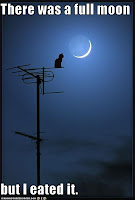 We talked about this on Tuesday: Scientific American has a nice article examining the widely-held belief that the full moon causes strange behavior. Research suggests the full moon doesn't have this effect:
We talked about this on Tuesday: Scientific American has a nice article examining the widely-held belief that the full moon causes strange behavior. Research suggests the full moon doesn't have this effect:"By combining the results of multiple studies and treating them as though they were one huge study—a statistical procedure called meta-analysis—[scientists] have found that full moons are entirely unrelated to a host of events, including crimes, suicides, psychiatric problems and crisis center calls. In their 1985 review of 37 studies entitled 'Much Ado about the Full Moon,' which appeared in one of psychology’s premier journals, Psychological Bulletin, Rotton and Kelly humorously bid adieu to the full-moon effect and concluded that further research on it was unnecessary."One reason the belief persists is a set of natural human cognitive biases in which we perceive correlations where no such correlations exist:
"Illusory correlations result in part from our mind’s propensity to attend to—and recall—most events better than nonevents. When there is a full moon and something decidedly odd happens, we usually notice it, tell others about it and remember it. We do so because such co-occurrences fit with our preconceptions. ... In contrast, when there is a full moon and nothing odd happens, this nonevent quickly fades from our memory. As a result of our selective recall, we erroneously perceive an association between full moons and myriad bizarre events."We'll be discussing these biases more when we study arguments about causes. Here's a cool video by psychological Dan Gilbert on our mistaken expectations:
No comments:
Post a Comment